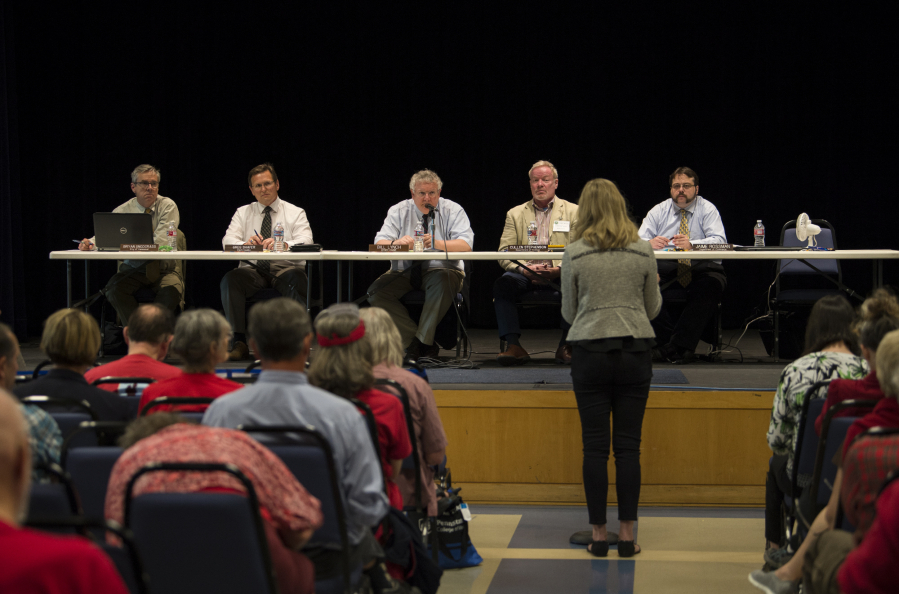Depending on who spoke, Vancouver Energy’s draft clean air permit is either an exemplary tool to control emissions and protect air quality, or a license to pollute, riddled with errors and omissions and a threat to the community’s health.
There wasn’t much of a middle ground.
The comments were made at a Wednesday public hearing held by the Washington state Energy Facility Site Evaluation Council on a draft notice of the construction air permit for the proposed Vancouver Energy oil terminal.
The permit hearing attracted a large audience that steadily trickled in and out of Clark College’s Gaiser Hall.
Port of Vancouver Commissioner Eric LaBrant was the first person to address the board; however, he made clear he was doing so not in an official capacity, but as a resident of the Fruit Valley neighborhood.
“I’ll be very direct. This permit is functionally meaningless and based on alternative facts,” he told the board. “An ongoing chemical spill in a neighborhood of 2,000 residents and 3,000 workers, for a promise of 176 jobs is a bad plan.”
Those 176 jobs would go to people directly employed at the terminal. Project supporters say its construction would create hundreds of temporary jobs.
The permit is required for new businesses or companies that require emission-control equipment or are increasing their air-pollutant emissions. Its goal is to ensure air pollution sources conform with state air-quality regulations. It must be acquired before the oil terminal can be built.
The event was scheduled to last eight hours. Members of the evaluation council sat at a table on stage, while speakers, one a time, testified for two minutes at a microphone in the middle of the room. By 4 p.m., more than 125 people signed up to comment.
Project opponents wore red, a color synonymous with the movement against fossil fuel transport in the Pacific Northwest. Most supporters who spoke were trades union members. Several of them wore orange or blue in solidarity.
Lee Newgent, executive secretary of the Washington State Building and Construction Trades Council, AFL-CIO, said this was his fourth time speaking in support of the terminal. He said his organization is in favor of the fossil fuel infrastructure being proposed in the Pacific Northwest.
“There’s $10 billion of privately invested infrastructure money in an area that has no infrastructure investment whatsoever. So we’re trying to rebuild the infrastructure using private money for products we actually need,” he said. “We’re not climate deniers in any way, shape or form … but we know our economy is tied to carbon use.”
The terminal is proposed for construction at the Port of Vancouver. If built, it would receive oil shipped by unit trains from of North Dakota and transfer it into marine vessels bound for refineries along the West Coast. The terminal would be capable of transferring an average of 360,000 barrels of oil per day.
In an email, Vancouver Energy spokesman Jeff Hymas said the company is confident in the terminal’s design and its ability to meet or exceed air-quality standards.
“We are committed to building and operating the proposed terminal in a safe and environmentally responsible way,” he said.
The evaluation council must address all the comments made on the draft before the final permit is issued. There is no estimate of when that will happen. The board has yet to release any final permits the project requires.
Later on, the evaluation council will hold one more public comment period and hearing for the industrial stormwater permit.
Gov. Jay Inslee has the final say on the terminal’s construction. But he can’t make a decision until after the evaluation council gives him a recommendation whether the project should be built or not. Organizations watching the process expect the council to release its decision later this summer.




